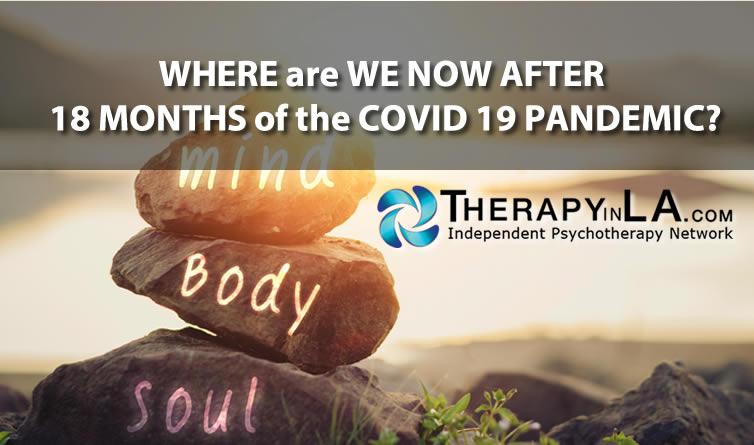
WHERE are WE NOW AFTER 18 MONTHS of the COVID 19 PANDEMIC?
By Alan M. Solomon, Ph.D.
We are approaching 18 months of living with the COVID 19 pandemic, which started mid-March 2020 in California with the announcement of the first restrictions in daily life. We have been through the first wave of infections, hospitalizations, and deaths, a respite in the summer and early fall of 2020, a second wave in late 2020 and early 2021, the start of and establishment of vaccinations, a re-opening of our lives in many ways as of mid-June 2021, and questions about Delta variants more recently. All of this has been taking place with a backdrop of political, social, and economic upheaval, life threatening for some of us, impactful for all of us to varying degrees.
The blogs, refreshed every two weeks, have tried to take all this into account. We’ve highlighted the risks: anxiety, depression, substance use and abuse, child abuse and domestic violence, the impact on education for our kids. More subtle than depression, we also acknowledged “languishing” and responding to it with “flow”.
So, where are we now after 18 months? Some sources describe us as being in a “grief pandemic”: trying to balance out a long period of distress with “getting back to normal”. One public health survey showed 8.5% of the population reporting symptoms of depression before the pandemic, compared to 27.8% during the pandemic. Combining anxiety with depression, 11% were suffering pre-pandemic, compared to 42% during the pandemic. That’s almost a fourfold increase! Pre-pandemic, about 11% of respondents had considered suicide in the previous year, compared to more than 25% having suicidal thoughts the previous 30 days during the pandemic.
The impact of all this is especially hard on younger folks. For those people who have been ill, especially more severely ill, and hospitalized, there are increased risks of PTSD. For people who lost a family member, or loved one to the virus, their grief has often been disrupted and not very well relieved since many grieving rituals and practices were not allowed due to pandemic restrictions.
Such “prolonged grief” may exacerbate difficulties with all the psychological risks listed above. Therapy is one helpful response for many individuals, couples, and families. The members of IPN are all very experienced and caring therapists, available to help, or at least make referrals if sessions cannot be scheduled.
Here are some other steps to consider:
- Start your day with a nurturing routine, even if it’s just a few moments with a cup of tea/coffee with some quiet time to focus for the day. If you’re an early riser, maybe some exercise or meditation/meditational reading, or journaling. A few moments for yourself before herding the kids into their morning routine is very helpful.
- Develop a playful and soothing activity for yourself, as part of decompressing from work.
- Create and then protect a hard start time and stop time for work. Working from home makes it more difficult to protect your private time, since you’re available so much more for work.
- Practice the opposite emotion of something you’re feeling and don’t want to feel. If you’re feeling immersed in sadness, watch some comedy, or call a friend with an infectious sense of humor. If you’re feeling lethargic, do some light exercise to activate your body.
- Say “no” more readily to demands and impingements on your time and schedule. It can be done firmly, and politely, with an offer to be available at some other time. Excuses and explanations are not necessary. Being able to say “no” to something or someone, means being able to say “yes” to something or someone else.
- Carve out time to decompress, regularly, and then protect it. This might be a brief walk, quiet time not interrupted, playing with your animal(s), and preferably not involving the use of alcohol or other substances.
- Connect with others, in ways that are genuinely supportive and refreshing. Increased isolation is a byproduct of our pandemic lives, for which regular relief is much needed.
- Exercise – regularly. It’s fundamentally a relief for depression and anxiety due to the simple and powerful physiological impact of exercise.
- Be present. Put aside all the devices and electronics to engage with what and who is in front of you – more fully.
- Immerse yourself in someone else’s words. Reading memoirs and meditative texts can be comforting, powerfully so, and inspiring.
- Listen to music – a favorite song, or artist, a theme song for yourself. If it includes singing or dancing, all the better. It literally engages a different part of the brain from our usual workday and routine activities, and there’s relief in that different brain activity.
All of the above efforts will be supported and encouraged by your IPN therapist. The challenges and trauma of the past 18 months may prompt memories, thoughts, and feelings about past experiences that were painful. Therapy is exactly the safe place in which to acknowledge, explore and develop genuine relief for these challenges.
(Sources for the above article include: Yong, The Atlantic, 5/20; Benson, NBC News, 5/18: Kristof, New York Times, 5/29; Szabo, Kaiser Health News/USA Today, 5/30; Benson, NBC News, 6/22, https://www.self.com/story/therapist-coping-skills)
Alan M. Solomon, Ph.D. is a clinical psychologist in private practice in Torrance, CA. A member of the Independent Psychotherapy Network, he can be reached at 310 539-2772 or dralanms@gmail.com In-person and telehealth sessions are available.
Copyright 2021 by Alan M. Solomon, Ph.D.
